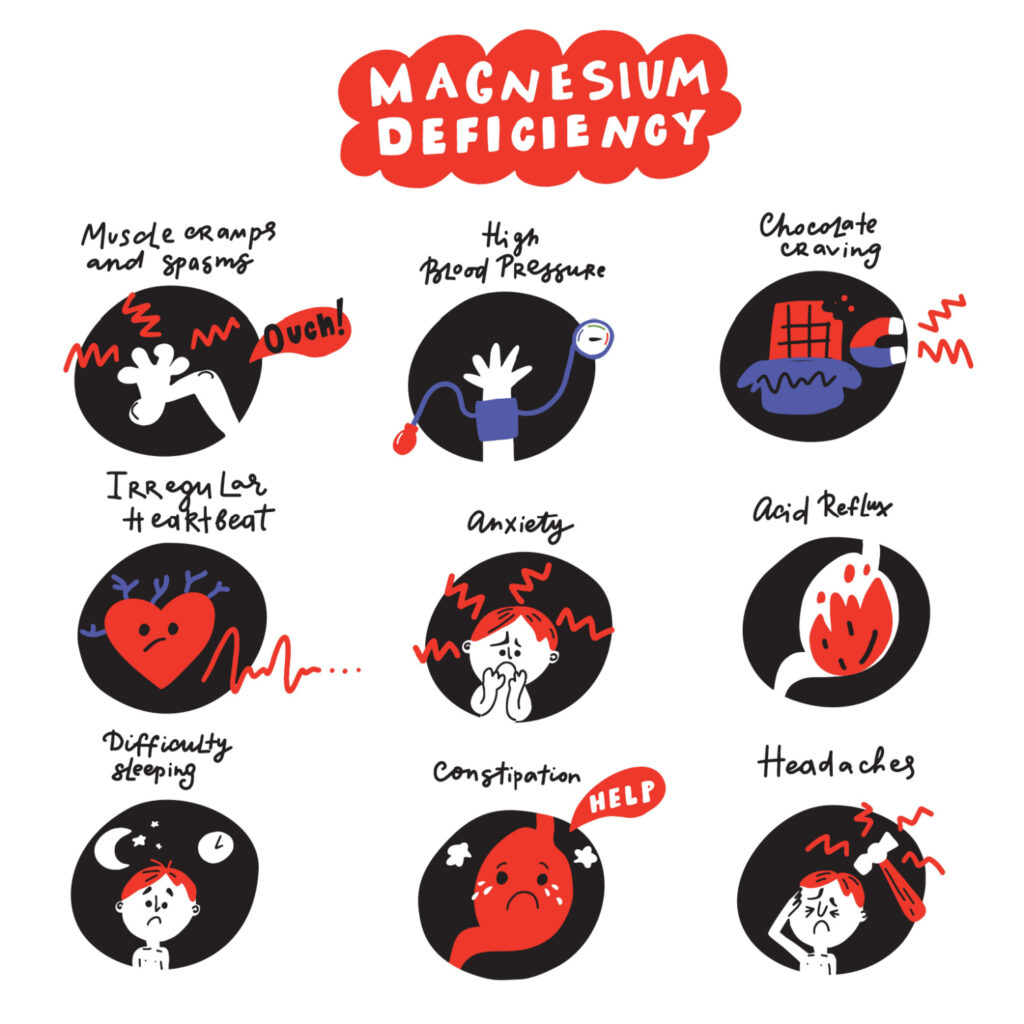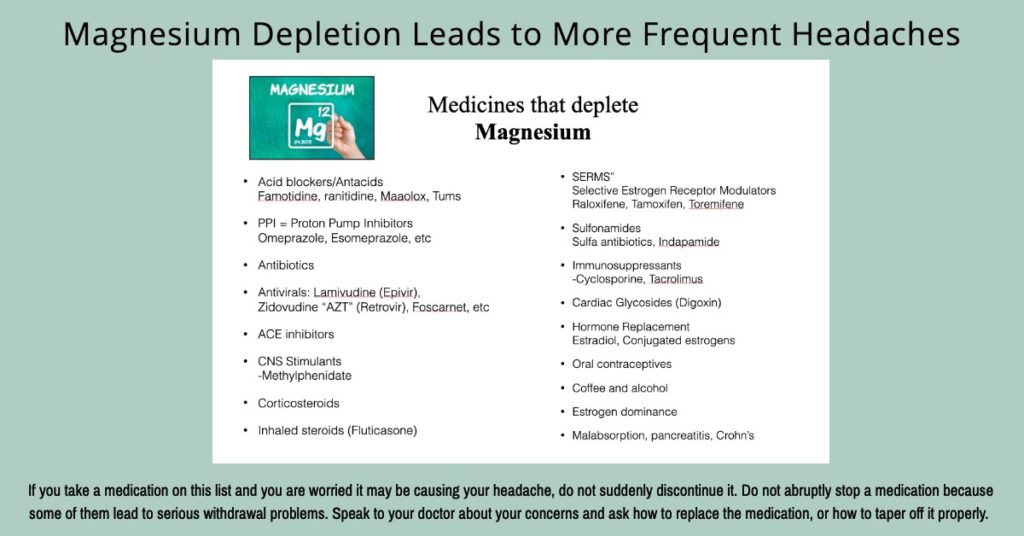What's On This Page?
ToggleMagnesium is a naturally occurring mineral that we need for good health. It’s helpful to reduce leg cramps, improve energy, and support blood pressure and heart rhythm. And so much more!
There are a lot of misunderstandings when it comes to magnesium and the different types of supplements available. Magnesium hydroxide for example reduces stomach acid, and like its sister supplement, magnesium citrate may induce bowel movements. Magnesium oxide is probably the most commonly found dietary supplement at pharmacies.
Unfortunately, practitioners often make a mistake and tell a patient/person to go buy magnesium without specifying which kind, or worse, just saying “Get any kind, they all work.” But nothing could be further from the truth. If you’re taking an oxide or citrate form, you will never get any bone benefits! That’s because some forms of magnesium stay in the gut pretty much and work as a laxative or an antacid. They aren’t intended for treating diseases like that, they just go through you!
That’s fine if you’re treating constipation or reflux (think of Maalox® which contains magnesium hydroxide), but it’s catastrophic to spend years buying a form of magnesium thinking you’ve done something good for your heart rhythm, depression, or bad T-score! That last one is a term commonly applied to bone density scans (DEXA scans).
Also, taking the wrong kind of magnesium will cause diarrhea.
You should know that magnesium is an essential mineral required for strong bones and teeth but only a few types leave the gut and get into the bloodstream. It plays a crucial role in mood, brain health, and cognition.
Having adequate levels of magnesium ensures attention span and focus. Furthermore, low magnesium (relative to calcium) will lead to long-lasting cramps and spasms. Severe hypomagnesemia will lead to cardiac irregularities and palpitations, as well as migraines and hypertension. WEBSITE.So severe is the deficiency with PPI drugs (those popular ones sold everywhere for acid blocking) that the FDA has put out a warning. You can read about that at the FDA’s Drug Safety
You can get magnesium from your diet by eating various foods such as leafy greens, nuts, and yogurt. With the acidification of soil, our crops are magnesium deficient, so you may not get enough. Another cause for magnesium deficiency is drinking a lot of caffeinated beverages or taking proton pump inhibitor (acid-blocking) drugs.
Allow me to briefly explain the various types of magnesium that are sold over the counter and online:
Symptoms of Magnesium Deficiency
Most of the symptoms of magnesium deficiency have to do with muscles (ie cramps), mood (ie sadness), or the cardiovascular system (ie heart rhythm changes) but there are others as you can see in this graphic.

Most people understand the critical role of magnesium, but not the different forms of magnesium that are sold at health food stores and online retailers. Let me briefly explain those now because the assortment is dizzying.
1. Magnesium Oxide
When people take this type of magnesium, they may develop stomach upset, bloating, diarrhea, and a lot of gas. The magnesium breaks off from the oxide, but not very much of it. In other words, you don’t get a lot of magnesium absorption.
Think of magnesium like a rock, it’s not going to break apart into tiny little particles and get absorbed well. Even though it has a high amount of elemental magnesium, and a small dose provides a large amount of magnesium per pill, it doesn’t come apart
easily. It’s not very bioavailable.
It’s widely available as a dietary supplement because it’s very cheap to make.
2. Magnesium Citrate
This type of magnesium is sold in tablets and in liquid. The tablets are pitched for bone health, however, just like the oxide form, the citrate form doesn’t get to your bones or your brain. The green liquid bottles of mag citrate you see at the pharmacy are used to evacuate the bowel prior to imaging procedures. That’s because this type of magnesium causes loose stools, diarrhea, gas, and stomach upset galore. I only recommend it as a laxative. Using my “rock” analogy, this is another hard rock, but it breaks into smaller pieces than the oxide form.
Magnesium citrate and oxide forms are perfect to use if you want to relieve constipation, they are more of a laxative form of magnesium. They are not useful when taken orally for replenishment of a deficiency.
There is a solution to the problem of poor bioavailability. And that is to use chemical (but breakable) molecular bonds to glue the magnesium to an amino acid. These breakable bonds mean that the rock will crumble and break into smaller pieces and come out of the gut and go into the bloodstream. It means that we can now increase the absorption of magnesium.
Please bear in mind I’m just using an analogy of a rock, you don’t actually have a “rock” inside you. In scientific speak, the chelate will break down into smaller pieces and absorb out of the gastrointestinal tract by going through amino acid transporters (in addition to a specific magnesium transporter) and it will make it into the body! Amino acid chelation of magnesium can limit the number of water molecules that the magnesium ion attracts, and this too improves bioavailability. There’s more, but I think my rock analogy is simpler.

3. Magnesium Hydroxide
Everything I stated above about magnesium citrate holds true for magnesium hydroxide. It’s in the medication category of “laxatives” but it’s also an antacid. As such, this form of magnesium not be absorbed into the body nor will it support other health issues such as weak bones, cardiac rhythm, mood or muscle health. Magnesium hydroxide is used to treat occasional constipation that adults and children may experience, and only for a short-term basis.
4. Chelated Magnesium
This is a slightly more expensive form of magnesium than the two listed above. The term “chelate” confuses people sometimes but it just means that the magnesium is bound to another thing (usually glycinate) and this makes the magnesium more stable as it goes through your stomach and into your intestines to get to the duodenum and ileum where it is best absorbed.
When that happens, there are fewer of those horrible GI symptoms associated with inferior forms. It’s a rock that breaks apart easily and therefore the crumbling allows for higher bioavailability. With higher absorption of magnesium into the bloodstream, you now see benefits outside the gut. This means that magnesium is able to penetrate the bones, brain, and heart. So you might see benefits to blood pressure, focus, attention, heart rate, and bone integrity. It’s because the improved stability of magnesium increases the absorption of the mineral and allows it to get where it needs to go in the human body.
Most “chelated” magnesium brands are bound to “glycinate” and you will also see it noted on the label as “Magnesium Bisglycinate” which is the same thing. This is a great form of magnesium to take at night because it helps with sleep. It also supports muscle health.* I’d say it is the most cost-effective, high-absorption type of magnesium and I highly recommend it. Perhaps this one is best taken at night for optimal rest. You can buy it at any health food shop, including my own.
5. MagTein® (Magnesium L-Threonate) is a Brain-loving Type of Magnesium
This is a chelated, patented brand name of magnesium that is found in high-quality formulas including my own MagFocus® powder which is also available on Amazon. Using my analogy of a rock, you might imagine that MagTein® crumbles into tiny particles. It transports itself out of the gut and goes where it’s needed, especially the brain to help with attention span, relaxation, and mood. Here’s an article I wrote, Your Brain Loves Magnesium L-Threonate and 5 Reasons to Use It.
The MagTein® supports brain health and may facilitate learning and memory, as well as a relaxed mood, and has been studied scientifically with published studies available online. It is a chelated form of magnesium. The mineral magnesium is chelated (bound) to threonic acid to form Magnesium L-Threonate. MagTein® is a quality brand name of that.
Using my analogy of a rock, this type of supplement ‘crumbles’ nicely into tiny particles and therefore has high bioavailability. It will transport itself out of the gut and get into the body wherever it’s needed.
A supplement that contains MagTein® as part of its formula is ideal for brain health, and cognition.* I’d suggest trying this one in the morning and starting at the lowest possible dose recommended on the label. It’s pretty powerful and makes some people woozy if they take too much!
Summary
The benefits of magnesium are undeniable. Levels of naturally occurring magnesium through diet have diminished due to the acidification of soil and unbalanced fertilization of the soil, and mostly a poor diet which contributes to microflora imbalances.
With magnesium content depleted in crops, and levels in the human body depleted by caffeine and junk food, magnesium deficiencies in the population are far more prevalent. Just look at the millions of people suffering from signs and symptoms of what appears to be magnesium deficiency. It is evidenced by excessive numbers of people suffering from hypertension, migraines, restless legs, leg cramps, depression, and osteoporosis.
Blood Testing for Magnesium
You can take a blood test for magnesium but it’s a little misleading. That’s because your serum levels will try to stay normal. Your body naturally dumps magnesium from your bones and teeth to keep blood levels steady. So you can’t ‘see’ what’s happening in the bones, you just know they are brittle. You also can’t see what’s happening inside the arteries or tissues, so you have to consider everything.
By everything, I mean your symptoms, diet, medication use, caffeine intake, and also the drug mugging effect. Frequent headaches are one symptom of deficiency that go under the radar because they are temporarily relieved by acetaminophen or other analgesics. But if you get frequent headaches or migraines, you may be short on mag. You may like this article, All the Amazing Benefits of Magnesium.
Instead of ordering a serum mag (serum level of magnesium), you can get a better test, but it takes a little longer to receive results. You can ask for an “RBC mag” which evaluates the level of magnesium in the red blood cells (RBC). This will offer more insight. Urinary magnesium excretion tests are available too, but not usually ordered. If you do this test, it should be interpreted in concert with serum concentrations of magnesium, not all by itself. In the presence of hypomagnesemia (magnesium deficiency), a “24-hour urine magnesium” that is greater than 24 mg/day -or fractional excretion greater than 0.5 percent- implies magnesium wasting from the kidneys. Speak to your doctor about this test, it is not frequently ordered. I only saw it ordered a few times in all my years of clinical practice. It may hold value for a few syndromes, including chronic renal failure or for patients with severe diabetes.
Drug Muggers of Magnesium

Did you know acid blockers deplete magnesium too? If you take antacids and acid-blocking medications, you may become severely deficient in this mineral, which again, controls heart rhythm. The FDA has put out warnings about magnesium depletion as it pertains to those drugs which people buy over the counter.
As for dietary supplements, there are thousands. Read the label, and make sure you choose a quality form of magnesium that actually leaves the gut and goes into the bloodstream where it can travel to your heart, bones, brain, and other tissues. So many people opt for cheap magnesium in the hopes that it will fix their osteoporosis or their mood or focus… but unfortunately, it just gives them a lot of embarrassing gas!
Do not opt for cheap forms if you’re treating a chronic condition. It’s apt to cause you embarrassing gas or diarrhea! Some people insist on taking these ‘laxative’ forms of magnesium and think, “I don’t care because it’s so cheap, I’ll just take more!” Don’t.
There is a problem with that thinking. Saving money by buying cheap magnesium and consuming extra pills to compensate for the poor bioavailability is harmful. It just causes a significant laxative effect and one that comes on quickly. You may not have time to get to the bathroom! You’re wasting money and time on the toilet. This is because cheap magnesium (especially the oxide or hydroxide form) has an osmotic effect on your gut. Why do you think they put that type of magnesium in Maalox®? It’s due to the laxative effect!
Sustained release forms of magnesium are also very useful if you know that you want coverage for more than a few hours, perhaps for arterial health and blood pressure.* If you need a good brand of that, I have some recommendations for you. Consider also that the dosage form is critical. If you can’t swallow with comfort, try a powder. If you have pill fatigue, or a sore throat, again powdered forms of minerals exist and they are an excellent alternative. I have a brand of this on AMAZON.
You see, the elemental magnesium needs to break off from the salt it’s bound to in order to get through the ion channels of the gut. Only higher-quality forms of magnesium can do that. Taking additional doses of a cheap version is asking for trouble and may lead to serious gastrointestinal adverse effects, dehydration, vomiting/nausea, and cardiac abnormalities.

Suzy Cohen, has been a licensed pharmacist for over 30 years and believes the best approach to chronic illness is a combination of natural medicine and conventional. She founded her own dietary supplement company specializing in custom-formulas, some of which have patents. With a special focus on functional medicine, thyroid health and drug nutrient depletion, Suzy is the author of several related books including Thyroid Healthy, Drug Muggers, Diabetes Without Drugs, and a nationally syndicated column.



